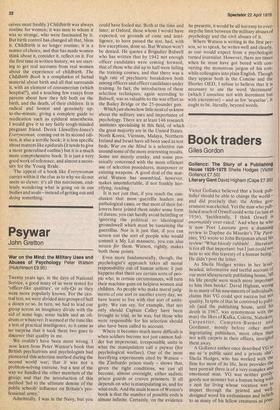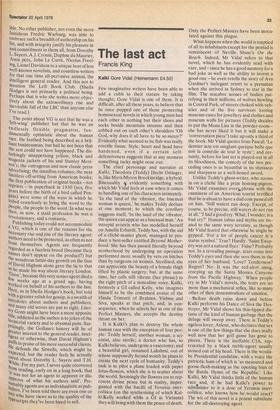Book traders
Giles Gordon
Gollancz: The Story of a Publishing House 1928-1978 Sheila Hodges (Victor Gollancz £7.50) Literary Gent David Higham (Cape £7.95) Victor Gollancz believed that a book pub lisle should be able to change the world and did precisely that: the Attlee government was elected. Yet the man who published much of Orwell could write (as late as 1956), 'Incidentally, I think Orwell is enormously over-rated.' And when he who is now Poet Laureate gave a damning review to Daphne du Maurier's The Parasites, VG wrote to John Betjeman about his review: 'What bloody rubbish!. . literature is not all that important: but I just could not, bear to see this travesty of a human being. He didn't post the letter. As Sheila Hodges writes in her levelheaded, informative and tactful account of our most idiosyncratic publishing house, `811 his life people were much more important to him than books'. David Higham, wrong in so many of his assessments of individuals, claims that VG could spot success but not quality. In spite of that he contrived to publ" ish (and the publishing house, until his death in 1967, was synonymous with the man) the likes of Kafka, Colette, Nabokov, Carpentier, Compton-Burnett and Gordimer, mostly before other more ingratiating publishers: more often than not with carpets in their offices, inveigled them away. A Gollancz author once described VG to me as `a public saint and a private shit'. Sheila Hodges, who has worked with the firm for most of its life, here provides the, best portrait there is of a very complex an° emotional man. VG was neither goodr goody nor monster but a human being with a zest for living whose vocation was to impart through the printed and Well. designed word his enthusiasms and beliefs to as many of his fellow creatures as poss. ible. No other publisher, not even the more fastidious Fredric Warburg, was able to embrace such a breadth of authorship on his list, and with integrity justify his pleasure in and commitment to them all, from Dorothy L. Sayers, A.J. Cronin, Daphne du Maurier, Amis plre, John Le Cane, Nicolas Freeling, Lionel Davidson to a unique host of less well-known novelists, and countless writers for that one time all-pervasive animal, the intelligent general reader. And this not to Mention the Left Book Club. (Sheila Hodges is not primarily a political being. Perhaps that is why she writes more objectively about the extraordinary rise and inevitable fall of the LBC than anyone else I've read.) The point about VG is not that he was a left-wing' publisher but that he was an endlessly flexible pragmatist, fundamentally optimistic about the human race. He loathed being described as a brilliant businessman, but had he not been that the rest could not have happened. The disturbingly unappetising yellow, black and Magenta jackets of his and Stanley Morison's; the outrageous and now classic press advertising; the omnibus volumes; the near limitless off-setting from American books; the first publication of original books — not reprints -in paperback in 1930 (yes, five Years before the birth of a bird called Penguin) were some of the ways in which he toiled ceaselessly to bring the word to the People, the people to the word. In what was then, as now, a staid profession he was a revolutionary, and a romantic. Publishing today could not accommodate a VG, which is one of the reasons for the necessary rise and rise of the literary agent: authors need to be protected, as often as not from themselves. Agents are frequently regarded as a faceless breed (because their names don't appear on the product?) but the wondrous latter-day growth on the face of David Higham alone gave the lie to that as he made his way about literary London. `Gave', because this very senior agent died a few weeks ago at a grand age, having Worked on behalf of his authors to the last. Here, as in Sheila Hodges's book, but told with a greater relish for gossip, is a wealth of anecdotes about authors and publishers, and many old scores are put to right. Liter Gems might have been a more apposite t,'tie, addicted as the author is to jokes of the lavatorial variety and to abysmal puns. SurPrisingly, the Gollancz history will be of t31eater interest to the general reader, intelligent or otherwise, than David Higham's
Puffs in praise of his more successful clients. Ho defends the Sitwells, which might be
expected, but the reader feels he actually
eElfed about Dorothy L. Sayers and T.H. A:hite. For my part, I never quite recovered
tr.orn reading, early on in a long book, that 'It was not for an agent to approve or disaPProve of what his authors said'. Prespantably agents are as individualistic as pub
Ishers. I've been told there are even one or tvv0 , Who have views as to the quality of the 'YPescripts they've been hired to sell.



































 Previous page
Previous page